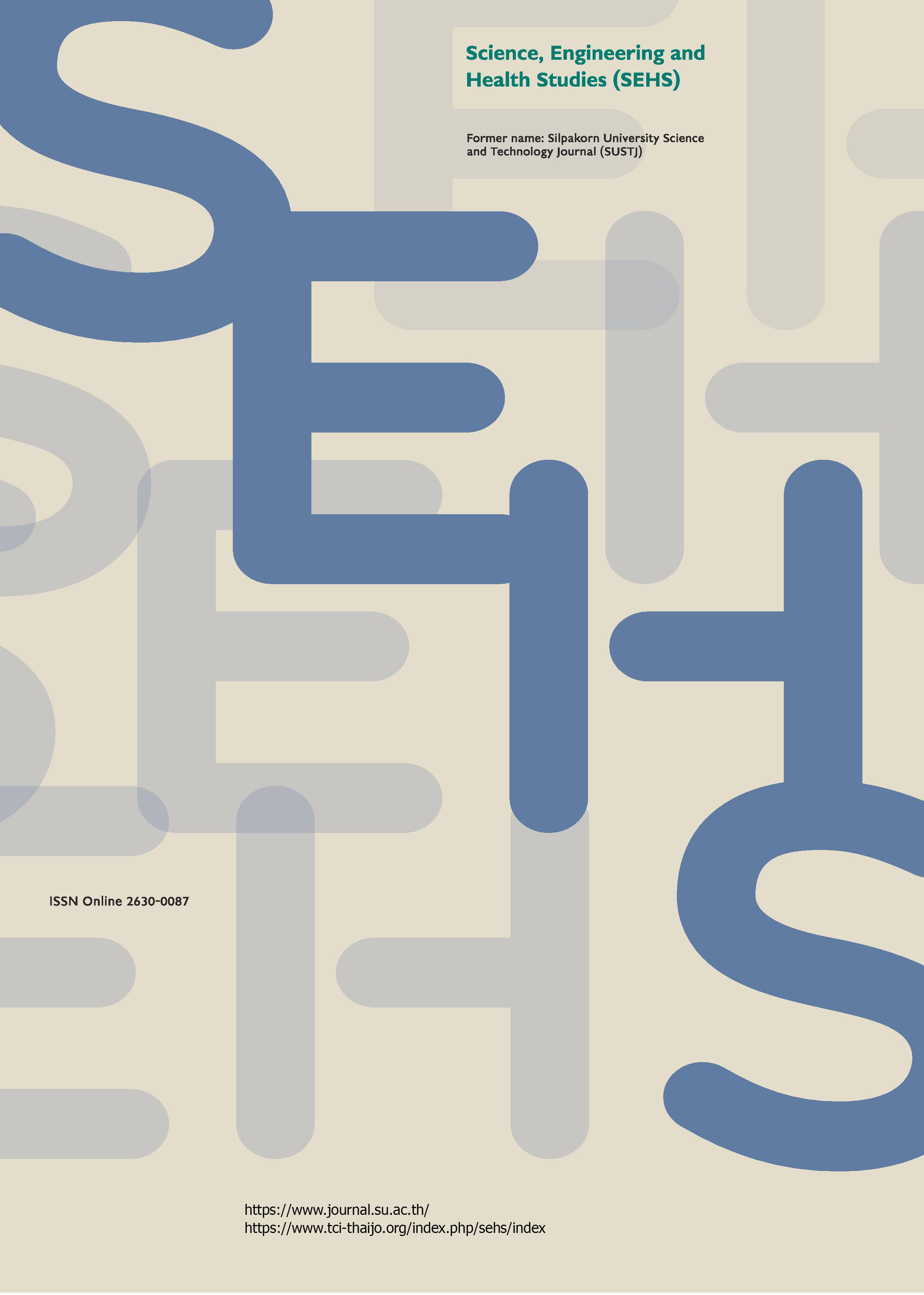Relationships between mental health literacy and stress, depression, and anxiety among patients with chronic heart failure in a cardiac outpatient department
Main Article Content
Abstract
This cross-sectional analytical study investigated the relationships between mental health literacy and stress, depression, and anxiety in chronic heart failure patients within a cardiac outpatient department. A simple random sample of 116 patients was included. Data were collected using questionnaires covering participant demographics, clinical information, and mental health aspect. The content validity (IOC) ranged from 0.67 to 1, and reliability, assessed using Cronbach's alpha coefficient, was 0.78 to 0.90. Data were analyzed by descriptive statistics and Pearson's correlation statistics. Findings reveal an average participant age of 60.86±12.98 years, with a male majority (66.38%). Mean scores were: mental health literacy component 184.28±23.38, stress 3.15±2.32; depression 7.83±4.84, and anxiety 52.27±11.58. Significant negative correlation existed between mental health literacy and stress (r = -0.306, p<0.001), depression (r = -0.590, p<0.001), and anxiety (r = -0.574, p<0.001). The study indicated that mental health literacy was at a good level among chronic heart failure patients, demonstrating a negative association with stress, depression, and anxiety. Therefore, cardiac outpatient departments could integrate care management strategies to promote mental health literacy and mitigate stress, depression, and anxiety in these patients.
Downloads
Article Details

This work is licensed under a Creative Commons Attribution-NonCommercial-NoDerivatives 4.0 International License.
References
Andresen, E. M., Malmgren, J. A., Carter, W. B., and Patrick, D. L. (1994). Screening for depression in well older adults: Evaluation of a short form of the CES-D. American Journal of Preventive Medicine, 10(2), 77–84.
Baumeister, H., Hutter, N., Bengel, J., and Härter, M. (2011). Quality of life in medically ill persons with comorbid mental disorders: A systematic review and meta-analysis. Psychotherapy Psychosomatics, 80(5), 275–286.
Division of Health Informatics and Surveillance. (2018). Epi Info™ [Computer software]. U.S. Department of Health and Human Services, Center for Surveillance, Epidemiology and Laboratory Services (CSELS). [Online URL: https://www.cdc.gov/epiinfo/support/downloads.html] accessed on January 22, 2020.
Fisher, L. J., and Goldney, R. D. (2003). Differences in community mental health literacy in older and younger Australians. International Journal of Geriatric Psychiatry, 18(1), 33–40.
Jiang, Y., Wang, L., Lu, Z., Chen, S., Teng, Y., Li, T., Li, Y., Xie, Y., and Zhao, M. (2021). Brain imaging changes and related risk factors of cognitive impairment in patients with heart failure. Frontiers in Cardiovascular Medicine, 8, 838680.
Jorm, A. F. (2000). Mental health literacy: Public knowledge and beliefs about mental disorders. British Journal of Psychiatry, 177(5), 396–401.
Jorm, A. F. (2012). Mental health literacy: Empowering the community to take action for better mental health. American Psychologist, 67(3), 231–243.
Jorm, A. F., Korten, A. E., Jacomb, P. A., Christensen, H., Rodgers, B., and Pollitt, P. (1997). Mental health literacy: A survey of the public's ability to recognise mental disorders and their beliefs about the effectiveness of treatment. Medical Journal of Australia, 166(4), 182–186.
Kim, Y. S., Lee, H. Y., Lee, M. H., Simms, T., and Park, B. H. (2017). Mental health literacy in Korean older adults: A cross-sectional survey. Journal of Psychiatric and Mental Health Nursing, 24(7), 523–533.
Mene-Afejuku, T. O., Pernia, M., Ibebuogu, U. N., Chaudhari, S., Mushiyev, S., Visco, F., and Pekler, G. (2019). Heart failure and cognitive impairment: Clinical relevance and therapeutic considerations. Current Cardiology Reviews, 15(4), 291–303.
O'Connor, C. M., Jiang, W., Kuchibhatla, M., Mehta, R. H., Clary, G. L., Cuffe, M. S., Christopher, E. J., Alexander, J. D., Califf, R. M., and Krishnan, R. R. (2008). Antidepressant use, depression, and survival in patients with heart failure. Archives of Internal Medicine, 168(20), 2232–2237.
Posai, V., Boonchoo, R., Watradul, D., Makkabphalanon, K., and Thangkratok, P. (2021). Mental health literacy and quality of life among patients with stroke. Chiang Mai Medical Journal, 60(1), 63–74.
Reavley, N. J., McCann, T. V., and Jorm, A. F. (2012). Mental health literacy in higher education students. Early Intervention in Psychiatry, 6(1), 45–52.
Rutledge, T., Reis, V. A., Linke, S. E., Greenberg, B. H., and Mills, P. J. (2006). Depression in heart failure a meta-analytic review of prevalence, intervention effects, and associations with clinical outcomes. Journal of the American College of Cardiology, 48(8), 1527–1537.
Samartzis, L., Dimopoulos, S., Tziongourou, M., and Nanas, S. (2013). Effect of psychosocial interventions on quality of life in patients with chronic heart failure: A meta-analysis of randomized controlled trials. Journal of Cardiac Failure, 19(2), 125–134.
Spielberger, C. D., Gorsuch, R. L., Lushene, R., Vagg, P. R., and Jacobs, G. A. (1983). Manual for the State-Trait Anxiety Inventory. Palo Alto, CA: Consulting Psychologists Press. pp. 22–25.
Thapinta, D. (1991). Reduction of anxiety of staff nursing working with AIDS patients through cognitive reconstructuring and mindfulness training. Doctoral dissertation, Chulalongkorn University, Thailand.


